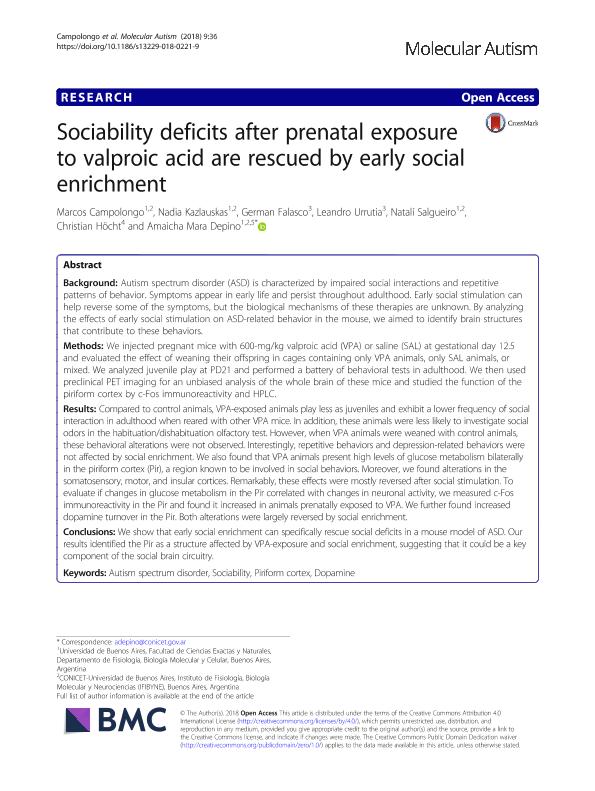Artículo
Sociability deficits after prenatal exposure to valproic acid are rescued by early social enrichment
Campolongo, Marcos Andrés ; Kazlauskas, Nadia
; Kazlauskas, Nadia ; Falasco, Germán Alfredo; Urrutia, Leandro; Salgueiro, Natalí; Höcht, Christian; Depino, Amaicha Mara
; Falasco, Germán Alfredo; Urrutia, Leandro; Salgueiro, Natalí; Höcht, Christian; Depino, Amaicha Mara
 ; Kazlauskas, Nadia
; Kazlauskas, Nadia ; Falasco, Germán Alfredo; Urrutia, Leandro; Salgueiro, Natalí; Höcht, Christian; Depino, Amaicha Mara
; Falasco, Germán Alfredo; Urrutia, Leandro; Salgueiro, Natalí; Höcht, Christian; Depino, Amaicha Mara
Fecha de publicación:
06/2018
Editorial:
BioMed Central
Revista:
Molecular Autism
ISSN:
2040-2392
Idioma:
Inglés
Tipo de recurso:
Artículo publicado
Clasificación temática:
Resumen
Background: Autism spectrum disorder (ASD) is characterized by impaired social interactions and repetitive patterns of behavior. Symptoms appear in early life and persist throughout adulthood. Early social stimulation can help reverse some of the symptoms, but the biological mechanisms of these therapies are unknown. By analyzing the effects of early social stimulation on ASD-related behavior in the mouse, we aimed to identify brain structures that contribute to these behaviors. Methods: We injected pregnant mice with 600-mg/kg valproic acid (VPA) or saline (SAL) at gestational day 12.5 and evaluated the effect of weaning their offspring in cages containing only VPA animals, only SAL animals, or mixed. We analyzed juvenile play at PD21 and performed a battery of behavioral tests in adulthood. We then used preclinical PET imaging for an unbiased analysis of the whole brain of these mice and studied the function of the piriform cortex by c-Fos immunoreactivity and HPLC. Results: Compared to control animals, VPA-exposed animals play less as juveniles and exhibit a lower frequency of social interaction in adulthood when reared with other VPA mice. In addition, these animals were less likely to investigate social odors in the habituation/dishabituation olfactory test. However, when VPA animals were weaned with control animals, these behavioral alterations were not observed. Interestingly, repetitive behaviors and depression-related behaviors were not affected by social enrichment. We also found that VPA animals present high levels of glucose metabolism bilaterally in the piriform cortex (Pir), a region known to be involved in social behaviors. Moreover, we found alterations in the somatosensory, motor, and insular cortices. Remarkably, these effects were mostly reversed after social stimulation. To evaluate if changes in glucose metabolism in the Pir correlated with changes in neuronal activity, we measured c-Fos immunoreactivity in the Pir and found it increased in animals prenatally exposed to VPA. We further found increased dopamine turnover in the Pir. Both alterations were largely reversed by social enrichment. Conclusions: We show that early social enrichment can specifically rescue social deficits in a mouse model of ASD. Our results identified the Pir as a structure affected by VPA-exposure and social enrichment, suggesting that it could be a key component of the social brain circuitry.
Palabras clave:
AUTISM SPECTRUM DISORDER
,
DOPAMINE
,
PIRIFORM CORTEX
,
SOCIABILITY
Archivos asociados
Licencia
Identificadores
Colecciones
Articulos(IFIBYNE)
Articulos de INST.DE FISIOL., BIOL.MOLECULAR Y NEUROCIENCIAS
Articulos de INST.DE FISIOL., BIOL.MOLECULAR Y NEUROCIENCIAS
Citación
Campolongo, Marcos Andrés; Kazlauskas, Nadia; Falasco, Germán Alfredo; Urrutia, Leandro; Salgueiro, Natalí; et al.; Sociability deficits after prenatal exposure to valproic acid are rescued by early social enrichment; BioMed Central; Molecular Autism; 9; 36; 6-2018; 1-17
Compartir
Altmétricas



